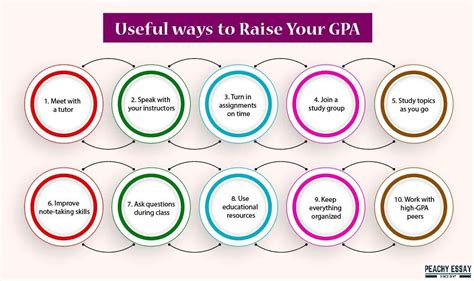Embarking on a university journey is a significant milestone, filled with opportunities for growth, learning, and self-discovery. One of the key aspects of university life is maintaining a strong academic record, often measured by the Grade Point Average (GPA). A high GPA not only reflects a student’s academic prowess but also opens doors to various opportunities, including scholarships, research positions, and prestigious job offers. However, achieving and maintaining a high GPA requires dedication, strategy, and effective time management. Here are 10 university tips designed to help students boost their GPA and make the most out of their academic experience.
1. Set Clear Academic Goals
Setting clear, achievable goals is the first step towards academic success. At the beginning of each semester, define what you want to achieve in terms of GPA. Break down your overall goal into smaller, manageable objectives for each course. This could involve achieving a certain grade in a particular assignment or exam. Having specific targets helps in focusing your efforts and staying motivated throughout the semester.
2. Develop a Study Schedule
A well-structured study schedule is crucial for balancing academic responsibilities with other aspects of university life. Allocate specific times for studying, attending classes, participating in extracurricular activities, and relaxation. Use calendars or planners to stay organized, and make sure to set aside dedicated blocks of time for each course, especially around exam periods.
3. Attend Classes Regularly
Regular attendance in classes is not just about fulfilling a requirement; it’s an opportunity to engage with the material, ask questions, and learn from the professor and peers. Many professors also factor attendance and participation into the final grade, making regular attendance a key strategy for improving your GPA.
4. Engage Actively in Class
Active engagement during classes can significantly enhance your understanding and retention of the material. This involves participating in discussions, asking insightful questions, and seeking clarification when needed. Active engagement not only improves your grasp of the subject matter but also demonstrates your commitment to learning, which can positively influence your grades.
5. Seek Help When Needed
University courses can be challenging, and it’s common to encounter difficulties. Don’t hesitate to seek help when you’re struggling with a concept or falling behind in your coursework. Professors, teaching assistants, and classmates can provide valuable support. Additionally, many universities offer tutoring services, academic support centers, and online resources that can help you better understand the material and stay on top of your assignments.
6. Use Active Learning Techniques
Adopting active learning techniques can significantly improve your retention and understanding of course material. This includes summarizing notes in your own words, creating concept maps, making flashcards, and self-testing. These techniques help in transforming information from short-term memory to long-term memory, reducing study time, and improving performance in exams.
7. Stay Organized
Staying organized is key to managing your time effectively and reducing stress. Keep all your notes, handouts, and assignments for each course in designated folders, both physically and digitally. Utilize cloud storage services to access your files from anywhere and collaborate with classmates on group projects. Regularly clean up your digital and physical spaces to avoid clutter and ensure you can find what you need quickly.
8. Form Study Groups
Forming study groups with your classmates can be a powerful way to learn and prepare for exams. Study groups provide an environment where you can discuss topics, share notes, explain concepts to each other, and quiz one another. This collaborative approach to learning not only helps in understanding complex concepts but also fosters teamwork and communication skills.
9. Manage Your Time Effectively During Exams
Effective time management during exams is crucial for performing well. Before the exam, make sure you understand the format, duration, and the types of questions that will be asked. During the exam, allocate your time wisely, ensuring you have enough time to attempt all questions. For essays and long answers, quickly outline your response before starting to write to ensure your answer is structured and addressed all parts of the question.
10. Take Care of Your Physical and Mental Health
Lastly, maintaining a high GPA while neglecting your health is not a sustainable or healthy approach to academic success. Ensure you get enough sleep, eat a balanced diet, and engage in regular physical activity. It’s also important to manage stress through meditation, mindfulness, or talking to a counselor. A healthy body and mind are more capable of handling the demands of university life and performing well academically.
Conclusion
Boosting your GPA is a challenging but achievable goal that requires a combination of effective study habits, strategic time management, and a proactive approach to learning. By implementing these tips, students can not only improve their academic performance but also develop valuable skills in time management, teamwork, and self-motivation that are essential for success beyond university. Remember, academic excellence is a journey that involves continuous learning, adaptation, and growth, and with the right strategies and mindset, any student can achieve their academic goals and unlock their full potential.
FAQ Section
How can I effectively manage my time to study for multiple exams at once?
+To manage your time effectively when studying for multiple exams, create a master calendar that outlines all your exams and their respective study materials. Allocate specific study times for each exam, prioritizing the ones that are closest or require the most preparation. Use the Pomodoro Technique, which involves studying in focused 25-minute increments, followed by a 5-minute break, to maintain productivity and avoid burnout.
What are some strategies for staying motivated during long study sessions?
+Staying motivated during long study sessions can be challenging, but several strategies can help. Setting small, achievable goals and rewarding yourself when you meet them can provide a sense of accomplishment and motivation. Additionally, explaining what you’re studying to someone else, whether it’s a friend, family member, or even a pet, can help reinforce your understanding and make the study session more engaging. Taking regular breaks to stretch, move around, and refresh your mind is also crucial for maintaining focus and motivation.
How can I balance academic responsibilities with extracurricular activities and social life?
+Balancing academic responsibilities with extracurricular activities and a social life requires careful time management and prioritization. Start by identifying your non-negotiables, such as attending all classes and completing assignments on time. Then, allocate specific times for extracurricular activities and social engagements, ensuring they do not conflict with your academic commitments. Learning to say “no” to non-essential activities and setting boundaries with friends and family can also help protect your study time and reduce stress.
Related Terms:
- GPA calculator
- What classes boost your GPA



